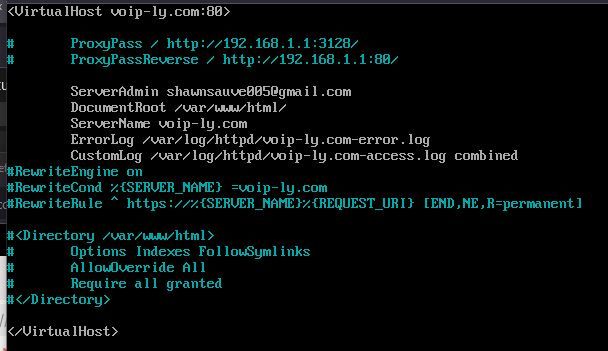Squid troubles, http not working
-
This is my first post. I am unable to get http access working with a squid proxy. I've googled around, tried a few guides, and no luck.
setup description:
WAN -> Proxmox -> pfSense/squid(VM) -> | vm: server 1 | vm: server 2|intent:
2 servers/VM on one IP address
server 1 would match to xyz.com and handle regular web traffic
server 2 would match to sub1.xyz.com and handle some other stuff.It's most likely some misconfiguration somewhere, but I'm just not sure where. Right now, I'm just focused on getting server 1 accessible.
server 1:
Alma Linux 9
apache has mod_proxysite conf file

/etc/hosts file

one guide said to create a conf file with the following.

pfSense:
squid installed
squidGuard installed/disabled for nowsquid conf
# This file is automatically generated by pfSense # Do not edit manually ! http_port 192.168.1.1:3128 icp_port 0 digest_generation off dns_v4_first off pid_filename /var/run/squid/squid.pid cache_effective_user squid cache_effective_group proxy error_default_language en icon_directory /usr/local/etc/squid/icons visible_hostname voip-ly.com cache_mgr admin@localhost access_log /var/squid/logs/access.log cache_log /var/squid/logs/cache.log cache_store_log none netdb_filename /var/squid/logs/netdb.state pinger_enable on pinger_program /usr/local/libexec/squid/pinger logfile_rotate 0 debug_options rotate=0 shutdown_lifetime 3 seconds # Allow local network(s) on interface(s) acl localnet src 192.168.1.0/24 forwarded_for on uri_whitespace strip acl dynamic urlpath_regex cgi-bin \? cache deny dynamic cache_mem 64 MB maximum_object_size_in_memory 256 KB memory_replacement_policy heap GDSF cache_replacement_policy heap LFUDA minimum_object_size 0 KB maximum_object_size 4 MB cache_dir ufs /var/squid/cache 100 16 256 offline_mode off cache_swap_low 90 cache_swap_high 95 cache deny all # Add any of your own refresh_pattern entries above these. refresh_pattern ^ftp: 1440 20% 10080 refresh_pattern ^gopher: 1440 0% 1440 refresh_pattern -i (/cgi-bin/|\?) 0 0% 0 refresh_pattern . 0 20% 4320 #Remote proxies # Setup some default acls # ACLs all, manager, localhost, and to_localhost are predefined. acl allsrc src all acl safeports port 21 70 80 210 280 443 488 563 591 631 777 901 3128 3129 1025-65535 acl sslports port 443 563 acl purge method PURGE acl connect method CONNECT # Define protocols used for redirects acl HTTP proto HTTP acl HTTPS proto HTTPS acl allowed_subnets src 192.168.1.0/24 http_access allow manager localhost http_access deny manager http_access allow purge localhost http_access deny purge http_access deny !safeports http_access deny CONNECT !sslports # Always allow localhost connections http_access allow localhost request_body_max_size 0 KB delay_pools 1 delay_class 1 2 delay_parameters 1 -1/-1 -1/-1 delay_initial_bucket_level 100 delay_access 1 allow allsrc # Reverse Proxy settings http_port 69.16.214.157:80 accel defaultsite=voip-ly.com vhost #alma9 server cache_peer 192.168.1.15 parent 80 0 proxy-only no-query no-digest originserver login=PASSTHRU connection-auth=on round-robin name=rvp_www #debian12.pbx cache_peer 192.168.1.16 parent 80 0 proxy-only no-query no-digest originserver login=PASSTHRU connection-auth=on round-robin name=rvp_pbx acl rvm_public url_regex -i voip-ly.com acl rvm_pbx url_regex -i voip-ly.com cache_peer_access rvp_www allow rvm_public cache_peer_access rvp_pbx allow rvm_pbx cache_peer_access rvp_www deny !rvm_public cache_peer_access rvp_pbx deny !rvm_pbx never_direct allow rvm_public never_direct allow rvm_pbx http_access allow rvm_public http_access allow rvm_pbx deny_info TCP_RESET allsrc # Custom options before auth # Set YouTube safesearch restriction acl youtubedst dstdomain -n www.youtube.com m.youtube.com youtubei.googleapis.com youtube.googleapis.com www.youtube-nocookie.com request_header_access YouTube-Restrict deny all request_header_add YouTube-Restrict none youtubedst # Setup allowed ACLs # Allow local network(s) on interface(s) http_access allow allowed_subnets http_access allow localnet # Default block all to be sure http_access deny allsrc -
Squid has a default gateway directive.
https://www.squid-cache.org/Doc/config/tls_outgoing_options/
https://www.squid-cache.org/Doc/config/tcp_outgoing_address/
Option Name: tcp_outgoing_address Replaces: Requires: Default Value: Address selection is performed by the operating system. Suggested Config: Allows you to map requests to different outgoing IP addresses based on the username or source address of the user making the request. tcp_outgoing_address ipaddr [[!]aclname] ... For example; Forwarding clients with dedicated IPs for certain subnets. acl normal_service_net src 10.0.0.0/24 acl good_service_net src 10.0.2.0/24 tcp_outgoing_address 2001:db8::c001 good_service_net tcp_outgoing_address 10.1.0.2 good_service_net tcp_outgoing_address 2001:db8::beef normal_service_net tcp_outgoing_address 10.1.0.1 normal_service_net tcp_outgoing_address 2001:db8::1 tcp_outgoing_address 10.1.0.3 Processing proceeds in the order specified, and stops at first fully matching line. Squid will add an implicit IP version test to each line. Requests going to IPv4 websites will use the outgoing 10.1.0.* addresses. Requests going to IPv6 websites will use the outgoing 2001:db8:* addresses. NOTE: The use of this directive using client dependent ACLs is incompatible with the use of server side persistent connections. To ensure correct results it is best to set server_persistent_connections to off when using this directive in such configurations. NOTE: The use of this directive to set a local IP on outgoing TCP links is incompatible with using TPROXY to set client IP out outbound TCP links. When needing to contact peers use the no-tproxy cache_peer option and the client_dst_passthru directive re-enable normal forwarding such as this. This clause only supports fast acl types. See https://wiki.squid-cache.org/SquidFaq/SquidAcl for details.